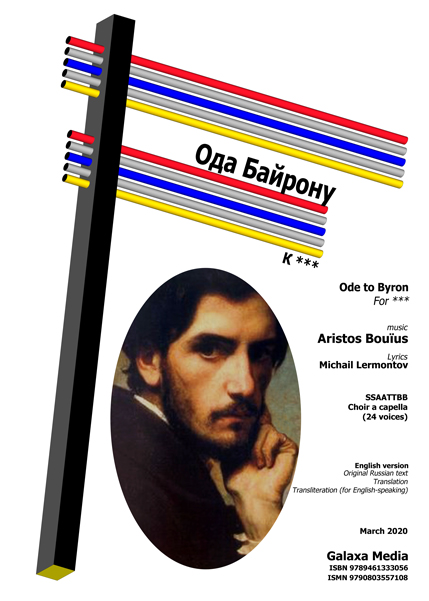

Ода Байрону
Ode to Byron
Ode to Byron
K ***
For ***
For ***
— On a poem by Mikhail Lermontov —
In the year Lermontov was born (1814), Byron was 26 years old and had already built up a great reputation as a bon vivant. Someone who enjoyed life and courted many ladies, as well as many men, for which he was already known at the time. He inherited the title of baron from his great-uncle, which means that to this day he is usually referred to as Lord Byron.
The main theme in his work as a poet, however, was his compassion for the oppressed, resulting, among other things, in The Prisoner of Chillon . In general, Don Juan is considered his most important work. He eventually sold his castle in Scotland to donate the money to the Greek war of liberation against the Turks. He died in Mesolongi in 1824.
Lermontov wrote his Ode to Byron (this title is mine) under the unpronounceable title For *** (subtitle in this composition) in 1830 - six years after Byron's death. What exactly has attracted him the most in Byron - the eventual success as a poet, his amorous excesses with the ladies and gentlemen, his flamboyant lifestyle, his generous sentiments towards the oppressed - has not become clear to me from literary historiography, although the poem itself gives some insights. In any case, it produced a passionate poem that I tried to translate into music. Below you will find the Russian text and my translation thereof. Lermontov died in 1841.
This lied is intended to be sung in Russian. The score contains a meticulous transliteration as well as a pronunciation guide for English singers who do not speak Russian. For a good understanding of the text, a translation has been added in the score (see also below).
The main theme in his work as a poet, however, was his compassion for the oppressed, resulting, among other things, in The Prisoner of Chillon . In general, Don Juan is considered his most important work. He eventually sold his castle in Scotland to donate the money to the Greek war of liberation against the Turks. He died in Mesolongi in 1824.
Lermontov wrote his Ode to Byron (this title is mine) under the unpronounceable title For *** (subtitle in this composition) in 1830 - six years after Byron's death. What exactly has attracted him the most in Byron - the eventual success as a poet, his amorous excesses with the ladies and gentlemen, his flamboyant lifestyle, his generous sentiments towards the oppressed - has not become clear to me from literary historiography, although the poem itself gives some insights. In any case, it produced a passionate poem that I tried to translate into music. Below you will find the Russian text and my translation thereof. Lermontov died in 1841.
This lied is intended to be sung in Russian. The score contains a meticulous transliteration as well as a pronunciation guide for English singers who do not speak Russian. For a good understanding of the text, a translation has been added in the score (see also below).
Aristos
The poem
Не думай, что я был достоин сожаленья,хотя теперь слова мои печальны.
Нет! Нет. Все мои жестокие мучениья –
одно предчувствие гораздо больших бед.
Я молод; но кипят на сердце звуки,
и Байрона достигнуть я б хотел.
У нас одна душа, одни и те же муки.
О если б одинаков был удел..!
Как он, ищу забвенья и свободы.
Как он, в ребячестве пылал уж я душой.
Любил закат в горах, пенящиеся воды,
И бурь земных и бурь небесных вой.
Как он, ищу спокойствия напрасно,
гоним повсюду мыслию одной.
Гляжу назад - прошедшее ужасно.
Гляжу вперëд - там нет души родной!
The translation
Don't think I'm lamentable,even though now my words are melancholy.
No. No! All my cruel torments are
only omens of much greater calamity.
I am young and sounds emerge from my heart,
I would so much like to meet Byron.
We share one soul, the same pain.
Oh, if only our fate would be the same..!
Like him, I seek carelessness and freedom.
Just like him, my soul has been glowing since I was a child.
I loved the sunset in the mountains, the sparkling water,
the howling of earthly and heavenly storms.
Like him, I search in vain for silence.
We pursue the same idea everywhere.
I look back - a terrible past.
I look forward - no soul mate in sight!
(© Translation: Aristos)
Below you can get an impression of the music.
I advise you not to listen to the music via a mobile phone, tablet or laptop. That could turn out to be a disappointment, unless you use very good headphones. For a reasonably acceptable experience, a computer with a good sound system is required!
Please note:

This music is an electronic representation and is therefore not comparable to a human version!
For example, one does not hear the words of the sung text by the choir, but only "aah" and "ooh".
The instruments, on the other hand, are quite realistic thanks to the latest electronics.
It remains, however, that the whole of the interpretation of the conductors/musicians is missing and therefore may sound somewhat sterile.
It remains, however, that the whole of the interpretation of the conductors/musicians is missing and therefore may sound somewhat sterile.
 |
© The complete copyright of the music (also this electronic version) has been deposited. This means that you can only listen but not use it nor partially, nor completely for your own purposes. Let alone that you use it for your own performances or productions.
For citation rights please contact the publisher and/or the Buma/Stemra organization in the Netherlands. |
Please keep in mind that the composition is predominantly piano (soft) in character but carries some forte (loud) peaks. So please set your sound level soft at the beginning. This also benefits the slow tempo and thus the meditative character of the music.
0:00
0:00
Niks gevonden!
Please, subscribe to the list on YouTube of my work (channel).
You can listen to the works wherever you have Internet, one after the other or individually.
If you subscribe, you will receive an email from Youtube when I have added a composition.
Click on the icon below.
You can listen to the works wherever you have Internet, one after the other or individually.
If you subscribe, you will receive an email from Youtube when I have added a composition.
Click on the icon below.

We did our utmost to make this site as simple and fast as possible. We recommend that you use a computer or tablet, even though the site adaps itself as much as possible to the dimensions of your screen and can therefore also be viewed on a mobile.
To listen to the compositions on this site, a computer and a good audio system are essential.
Site created by: © Galaxa Design - copying the site, or any part of the content, music or images is prohibited without prior written permission of the publisher. To contact the publisher, please use Galaxa Media Publishing House. To contact the composer use Aristos Bouïus.
Site created by: © Galaxa Design - copying the site, or any part of the content, music or images is prohibited without prior written permission of the publisher. To contact the publisher, please use Galaxa Media Publishing House. To contact the composer use Aristos Bouïus.





